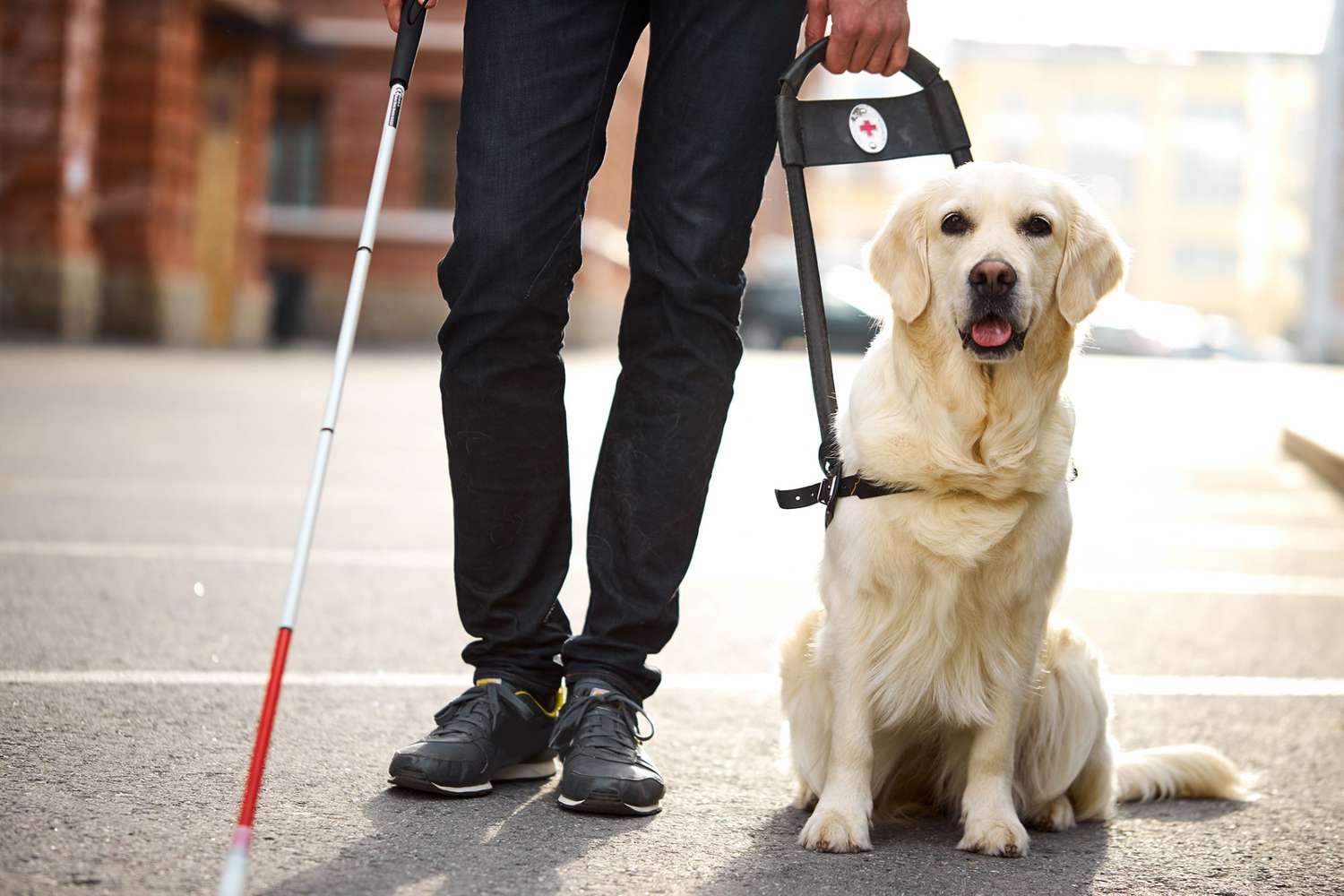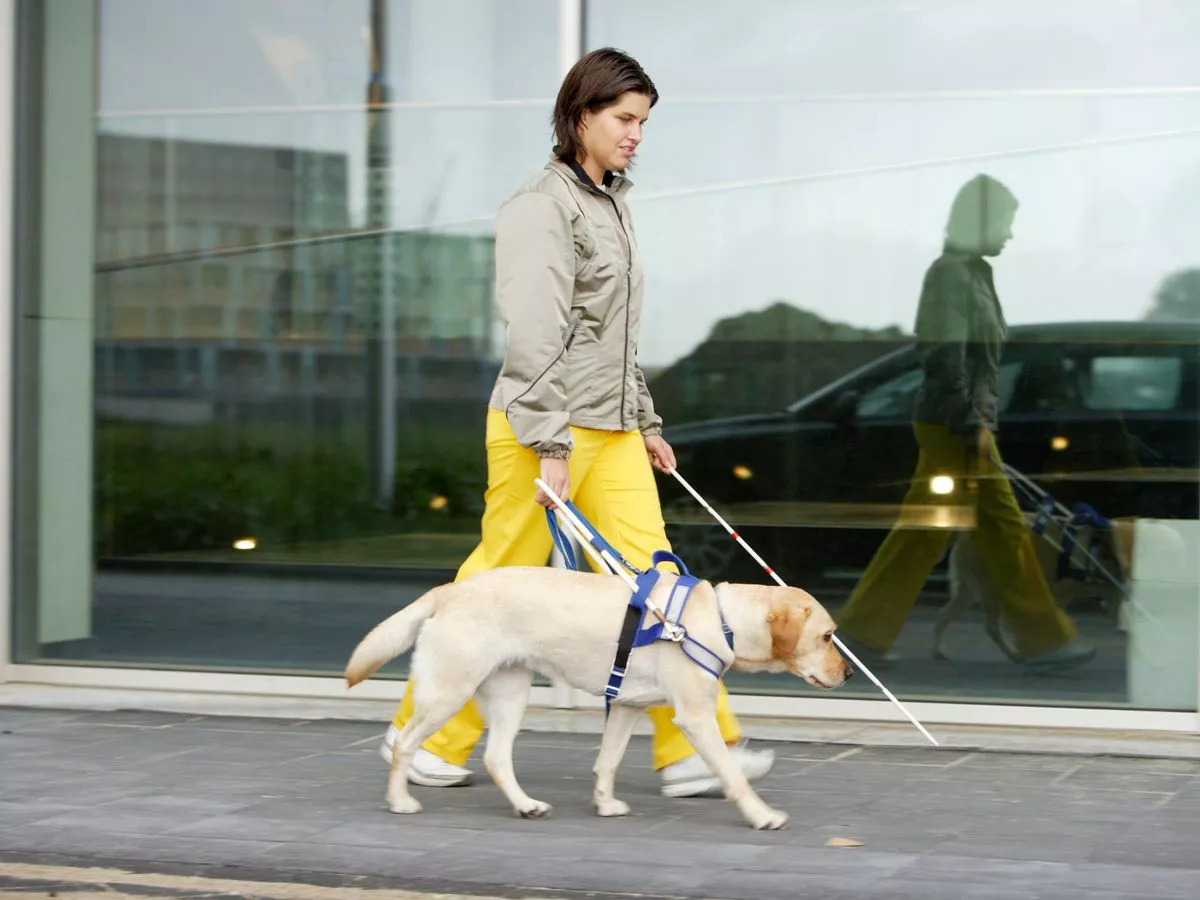Home>Health & Wellness>Behavior & Cognitive Care>How Does A Therapy Dog Help With Anxiety


Behavior & Cognitive Care
How Does A Therapy Dog Help With Anxiety
Published: January 29, 2024
Discover how therapy dogs provide support for anxiety through behavior and cognitive care. Learn how these specially trained dogs can help alleviate anxiety symptoms.
(Many of the links in this article redirect to a specific reviewed product. Your purchase of these products through affiliate links helps to generate commission for Pawsomeoldies.com, at no extra cost. Learn more)
Table of Contents
Introduction
Anxiety is a prevalent mental health condition that can significantly impact a person's daily life, causing feelings of unease, fear, and worry. It can manifest in various forms, such as generalized anxiety disorder, social anxiety, panic disorder, and specific phobias. Individuals experiencing anxiety may find it challenging to cope with everyday stressors, leading to a decreased quality of life and potential disruptions in personal and professional spheres.
In recent years, the use of therapy dogs has gained recognition as a valuable complementary approach to alleviate anxiety symptoms. These specially trained canines offer emotional support and comfort to individuals dealing with anxiety, contributing to improved mental well-being and overall emotional stability. The presence of a therapy dog can provide a sense of calm and reassurance, helping to mitigate the distressing effects of anxiety.
As we delve into the multifaceted realm of anxiety and the profound impact of therapy dogs, it becomes evident that these remarkable animals play a pivotal role in enhancing the lives of those grappling with anxiety-related challenges. Through their unique abilities and unwavering companionship, therapy dogs offer a ray of hope and solace to individuals navigating the complexities of anxiety disorders.
Read more: How To Help Aggressive Anxiety In Dogs
Understanding Anxiety
Anxiety is a complex and multifaceted mental health condition that encompasses a broad spectrum of emotional and physiological responses. It is characterized by persistent feelings of apprehension, fear, and worry, often accompanied by physical symptoms such as increased heart rate, muscle tension, and restlessness. Individuals grappling with anxiety may experience a heightened sense of unease and find it challenging to manage their emotions effectively.
The impact of anxiety extends beyond temporary feelings of nervousness, as it can significantly disrupt daily functioning and diminish overall well-being. Generalized anxiety disorder, social anxiety, panic disorder, and specific phobias are among the various forms in which anxiety manifests, each presenting its own set of challenges and symptoms. These conditions can lead to avoidance behaviors, strained interpersonal relationships, and a diminished capacity to engage in routine activities.
Moreover, the pervasive nature of anxiety can contribute to a sense of isolation and emotional exhaustion, further exacerbating the individual's distress. It is essential to recognize that anxiety is a legitimate and impactful mental health concern that warrants understanding, empathy, and effective support mechanisms.
As we strive to comprehend the intricate nature of anxiety, it becomes evident that the emotional and psychological toll it exacts necessitates a holistic approach to management and treatment. This includes the exploration of innovative interventions that complement traditional therapeutic modalities, offering individuals a comprehensive toolkit to address their anxiety-related challenges.
In the context of anxiety management, the utilization of therapy dogs has emerged as a promising avenue for providing emotional support and comfort to individuals navigating the complexities of anxiety disorders. These remarkable canines possess a unique capacity to alleviate anxiety symptoms and foster a sense of calm and security, thereby contributing to enhanced emotional well-being and improved quality of life for those grappling with anxiety.
Understanding the nuanced manifestations of anxiety and the profound impact it has on individuals underscores the importance of embracing diverse and effective strategies to address this prevalent mental health concern. By acknowledging the intricate interplay of emotional, cognitive, and physiological factors inherent in anxiety, we can cultivate a more empathetic and informed approach to supporting individuals on their journey toward emotional resilience and well-being.
What is a Therapy Dog?
A therapy dog is a specially trained canine that provides comfort, affection, and emotional support to individuals in various settings, such as hospitals, nursing homes, schools, and rehabilitation centers. Unlike service dogs, which are trained to assist individuals with specific disabilities, therapy dogs are trained to offer therapeutic benefits to people in need, promoting their overall well-being and emotional stability.
These remarkable canines undergo rigorous training to develop the temperament and skills necessary for interacting with diverse individuals in a range of environments. They are adept at providing unconditional love and companionship, thereby fostering a sense of calm and reassurance among those they encounter. Therapy dogs exhibit a gentle and amiable demeanor, enabling them to form meaningful connections with people and offer solace during challenging circumstances.
The presence of a therapy dog can have a profound impact on individuals facing emotional or physical difficulties. Their soothing presence and nonjudgmental nature create an environment conducive to relaxation and emotional expression, making them invaluable partners in therapeutic interventions. Whether engaging in comforting interactions with hospital patients, offering support to individuals with anxiety disorders, or assisting children with special needs, therapy dogs play a pivotal role in enhancing the emotional well-being of those they encounter.
It is important to note that therapy dogs are not considered as pets in these settings; rather, they are regarded as trained professionals integral to the therapeutic process. Their ability to forge genuine connections and provide unconditional support distinguishes them as valuable allies in promoting emotional resilience and well-being. The positive impact of therapy dogs extends beyond momentary interactions, as their presence can contribute to a lasting sense of comfort and emotional stability for individuals navigating challenging circumstances.
In essence, therapy dogs serve as compassionate ambassadors of comfort and empathy, enriching the lives of those they interact with through their unwavering companionship and innate ability to provide emotional support. Their role in fostering a nurturing and therapeutic environment underscores the profound impact they have on individuals' emotional well-being, making them indispensable assets in diverse healthcare and therapeutic settings.
Benefits of Therapy Dogs for Anxiety
The utilization of therapy dogs as a complementary approach to alleviate anxiety has garnered widespread recognition due to the myriad benefits they offer to individuals grappling with anxiety-related challenges. These remarkable canines play a pivotal role in enhancing emotional well-being and fostering a sense of calm and reassurance, thereby contributing to improved mental health outcomes for those navigating the complexities of anxiety disorders.
Alleviation of Emotional Distress
Therapy dogs are adept at providing unconditional love, comfort, and companionship, which can significantly alleviate emotional distress associated with anxiety. Their soothing presence and nonjudgmental nature create a conducive environment for individuals to express their emotions and find solace during moments of heightened anxiety. The genuine connections forged with therapy dogs can serve as a source of emotional support, offering a respite from the overwhelming feelings of unease and worry.
Read more: How To Help Dogs With Anxiety At Night
Reduction of Anxiety Symptoms
Interacting with therapy dogs has been shown to reduce anxiety symptoms, including heightened stress levels and physiological manifestations of anxiety such as increased heart rate and muscle tension. The calming effect of spending time with a therapy dog can promote relaxation and a sense of tranquility, helping individuals manage their anxiety more effectively and mitigate the disruptive impact it has on their daily lives.
Enhancement of Social Engagement
For individuals experiencing social anxiety, therapy dogs can serve as catalysts for increased social engagement. The presence of these canines can create opportunities for positive social interactions, fostering a sense of connection and belonging. This can be particularly beneficial in therapeutic settings, where individuals may experience apprehension in social situations. Therapy dogs offer a non-threatening and comforting presence, facilitating meaningful social interactions and promoting a sense of community.
Distraction from Negative Thought Patterns
Engaging with therapy dogs can provide a welcome distraction from negative thought patterns and rumination commonly associated with anxiety. The playful and affectionate nature of these canines can shift individuals' focus away from distressing thoughts, redirecting their attention toward the present moment and the joyous interactions with the therapy dog. This redirection of focus can contribute to a temporary reprieve from anxiety-related concerns, fostering a more positive and uplifting emotional experience.
Promotion of Relaxation and Stress Reduction
Therapy dogs have a remarkable ability to promote relaxation and reduce stress levels through their calming presence and gentle demeanor. Spending time with a therapy dog can evoke feelings of comfort and security, eliciting a relaxation response that counteracts the physiological and psychological effects of anxiety. This can lead to a reduction in overall stress levels and an enhanced sense of emotional well-being for individuals seeking relief from anxiety.
In essence, the benefits of therapy dogs for anxiety are multifaceted, encompassing emotional support, symptom alleviation, social facilitation, distraction from negative thought patterns, and stress reduction. These invaluable contributions underscore the profound impact therapy dogs have on individuals grappling with anxiety, offering a ray of hope and comfort in their journey toward emotional resilience and well-being.
Read more: How To Help Your Dog With Storm Anxiety
How Therapy Dogs Help with Anxiety
Therapy dogs play a pivotal role in providing invaluable support to individuals grappling with anxiety, offering a multifaceted approach to alleviating the emotional and physiological challenges associated with anxiety disorders. Their unique ability to foster a sense of calm, comfort, and emotional stability contributes to improved mental well-being and enhanced coping mechanisms for those navigating the complexities of anxiety.
1. Emotional Support and Comfort
Therapy dogs excel in providing unconditional love and companionship, creating a nurturing environment where individuals can seek solace during moments of heightened anxiety. Their nonjudgmental nature and innate capacity to form genuine connections offer a source of emotional support, alleviating feelings of distress and fostering a sense of reassurance.
2. Stress Reduction and Relaxation
The calming presence of therapy dogs has a profound impact on reducing stress levels and promoting relaxation. Interacting with these canines can evoke a relaxation response, counteracting the physiological manifestations of anxiety and creating a tranquil space where individuals can experience a temporary reprieve from their anxiety-related concerns.
3. Social Facilitation and Connection
For individuals grappling with social anxiety, therapy dogs serve as catalysts for increased social engagement. Their presence creates opportunities for positive social interactions, fostering a sense of connection and belonging. This can be particularly beneficial in therapeutic settings, where individuals may experience apprehension in social situations, thereby promoting a sense of community and emotional well-being.
Read more: How To Help Dog With Crate Anxiety
4. Distraction from Negative Thought Patterns
Engaging with therapy dogs provides a welcome distraction from negative thought patterns and rumination commonly associated with anxiety. The playful and affectionate nature of these canines redirects individuals' focus, offering a respite from distressing thoughts and fostering a more positive and uplifting emotional experience.
5. Alleviation of Anxiety Symptoms
Therapy dogs have been shown to reduce anxiety symptoms, including heightened stress levels and physiological manifestations of anxiety such as increased heart rate and muscle tension. Their soothing presence and comforting interactions contribute to improved emotional stability and enhanced coping mechanisms for individuals navigating the challenges of anxiety.
In essence, therapy dogs offer a holistic and compassionate approach to alleviating anxiety, encompassing emotional support, stress reduction, social facilitation, distraction from negative thought patterns, and symptom alleviation. Their unwavering companionship and unique ability to provide comfort and reassurance make them indispensable allies in promoting emotional resilience and well-being for individuals grappling with anxiety-related challenges.
Training and Certification for Therapy Dogs
The training and certification process for therapy dogs is a rigorous and comprehensive endeavor designed to equip these canines with the necessary skills and temperament to fulfill their vital role in providing emotional support and comfort to individuals in need. The journey toward becoming a certified therapy dog encompasses specialized training, behavioral assessments, and adherence to stringent standards, ensuring that these remarkable canines are well-prepared to make a positive impact in diverse therapeutic settings.
Specialized Training
Therapy dogs undergo specialized training to develop the temperament and social skills essential for interacting with individuals in various environments. This training focuses on cultivating traits such as calmness, obedience, and sociability, enabling therapy dogs to engage with diverse populations in a gentle and reassuring manner. Additionally, they are exposed to simulated therapeutic scenarios to acclimate them to the unique dynamics of providing emotional support in healthcare facilities, schools, and other settings.
Behavioral Assessments
Prior to certification, therapy dogs undergo behavioral assessments to evaluate their suitability for therapeutic work. These assessments encompass observations of the dog's interactions with people, response to stimuli, and ability to remain composed in unfamiliar or potentially challenging situations. Through these assessments, trainers and evaluators gain insight into the dog's demeanor, ensuring that they exhibit the requisite traits to excel in their role as therapy animals.
Adherence to Standards
Certification for therapy dogs entails adherence to established standards set forth by reputable therapy dog organizations. These standards encompass criteria related to the dog's behavior, health, and interactions with individuals, as well as the handler's responsibilities in facilitating safe and effective therapeutic engagements. By upholding these standards, therapy dogs and their handlers demonstrate a commitment to professionalism and ethical conduct, thereby instilling confidence in the individuals and facilities they serve.
Ongoing Education and Evaluation
Certified therapy dogs and their handlers engage in ongoing education and evaluation to maintain their certification and enhance their skills. This may involve participation in continuing education programs, refresher courses, and periodic evaluations to ensure that the dog remains well-suited for therapeutic work. Additionally, handlers receive guidance on best practices for facilitating meaningful interactions and promoting the well-being of both the therapy dog and the individuals they engage with.
The training and certification process for therapy dogs exemplifies a dedication to excellence and the profound impact these canines have on the emotional well-being of those they encounter. By undergoing rigorous training, behavioral assessments, and adherence to established standards, therapy dogs are equipped to fulfill their vital role as compassionate companions, offering comfort and support to individuals navigating the complexities of anxiety and other emotional challenges.
Finding a Therapy Dog for Anxiety Relief
Finding a therapy dog for anxiety relief involves a thoughtful and purposeful process aimed at identifying a canine companion that aligns with an individual's specific emotional and therapeutic needs. The journey toward selecting a therapy dog entails careful consideration of factors such as temperament, compatibility, and the intended therapeutic objectives, ensuring that the chosen canine partner possesses the qualities essential for providing effective emotional support and comfort.
One of the primary considerations when seeking a therapy dog for anxiety relief is the dog's temperament and demeanor. It is crucial to select a canine companion with a gentle, calm, and empathetic disposition, as these traits are instrumental in fostering a sense of reassurance and emotional stability for individuals grappling with anxiety. Additionally, the dog's ability to form genuine connections and exhibit nonjudgmental behavior is paramount, creating an environment conducive to emotional expression and comfort.
Compatibility between the individual and the therapy dog is another pivotal aspect to evaluate. The canine partner should resonate with the individual on a personal and emotional level, establishing a bond built on trust, understanding, and mutual respect. This compatibility fosters a sense of companionship and emotional connection, laying the foundation for meaningful therapeutic interactions and the alleviation of anxiety-related distress.
Furthermore, the intended therapeutic objectives and goals play a central role in the selection process. It is essential to delineate the specific ways in which the therapy dog will contribute to anxiety relief, whether through providing emotional support, promoting relaxation, or facilitating social engagement. By aligning the dog's unique abilities with the individual's therapeutic needs, a tailored and effective approach to anxiety relief can be established, maximizing the therapeutic benefits of the canine partnership.
When seeking a therapy dog for anxiety relief, individuals may explore reputable therapy dog organizations, shelters, or breeders with experience in training and certifying therapy dogs. These sources can provide guidance and assistance in identifying a suitable therapy dog based on the individual's preferences, lifestyle, and therapeutic requirements. Additionally, engaging with certified therapy dog handlers and participating in introductory sessions can offer valuable insights into the potential canine partners and their capacity to contribute to anxiety relief.
In essence, finding a therapy dog for anxiety relief involves a deliberate and personalized process that prioritizes the dog's temperament, compatibility with the individual, and alignment with therapeutic objectives. By approaching the selection process with mindfulness and consideration, individuals can identify a compassionate and supportive therapy dog that serves as a steadfast ally in their journey toward emotional resilience and well-being.
Read more: How To Help My Dog Overcome Noise Anxiety
Conclusion
In conclusion, the utilization of therapy dogs as a complementary approach to alleviate anxiety represents a profound and multifaceted intervention that offers invaluable emotional support, comfort, and companionship to individuals navigating the complexities of anxiety disorders. The presence of these remarkable canines fosters a nurturing and therapeutic environment, contributing to improved emotional well-being, enhanced coping mechanisms, and a sense of reassurance for those grappling with anxiety-related challenges.
Therapy dogs play a pivotal role in alleviating emotional distress, reducing anxiety symptoms, and promoting relaxation through their calming presence and unwavering companionship. Their ability to facilitate social engagement, distract from negative thought patterns, and offer nonjudgmental support underscores the multifaceted impact they have on individuals' emotional well-being. By forging genuine connections and providing unconditional love, therapy dogs serve as compassionate ambassadors of comfort and empathy, offering a ray of hope and solace to those navigating the complexities of anxiety.
The training and certification process for therapy dogs exemplify a dedication to excellence and the profound impact these canines have on the emotional well-being of those they encounter. By undergoing rigorous training, behavioral assessments, and adherence to established standards, therapy dogs are equipped to fulfill their vital role as compassionate companions, offering comfort and support to individuals navigating the complexities of anxiety and other emotional challenges.
In the quest to find a therapy dog for anxiety relief, individuals embark on a purposeful and personalized journey aimed at identifying a canine companion that aligns with their specific emotional and therapeutic needs. By considering factors such as temperament, compatibility, and therapeutic objectives, individuals can select a therapy dog that serves as a steadfast ally in their journey toward emotional resilience and well-being.
Ultimately, the profound impact of therapy dogs on anxiety relief underscores the transformative power of human-animal interactions in promoting emotional well-being and fostering a sense of calm and reassurance. These remarkable canines stand as beacons of empathy and comfort, offering unwavering support to individuals grappling with anxiety and illuminating a path toward emotional resilience and well-being.










